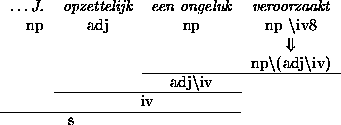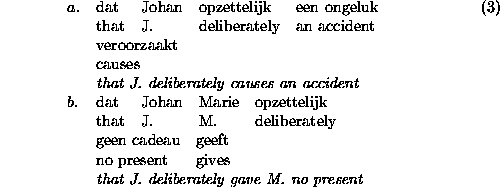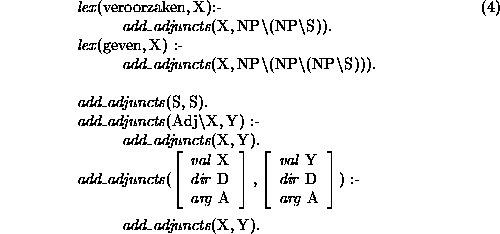


Next: Cross-Serial Dependencies Up: Recursive Constraints Previous: Subject-verb agreement
Adjuncts as arguments
Miller [13] proposes a lexical rule for French nouns which adds an (modifying) adjective to the list of arguments that the noun subcategorizes for. Since a noun can be modified by any number of adjectives, the rule must be optional as well as recursive. The advantages of using a lexical rule in this case is that it simplifies accounting for agreement between nouns and adjectives and that it enables an account of word order constraints between arguments and modifiers of a noun in terms of obliqueness.
The idea that modifiers are introduced by means of a lexical rule can be extended to verbs. That is, adjuncts could be introduced by means of a recursive rule that optionally adds these elements to verbal categories. Such a rule would be an alternative for the standard categorial analysis of adjuncts as (endocentric) functors. There is reason to consider this alternative.
In Dutch, for instance, the position of verb modifiers is not fixed. Adjuncts
can in principle occur anywhere to the left of the verb:
There are several ways to account for this fact. One can assign multiple
categories to adjuncts or one can assign a polymorphic category
 to
adjuncts, with X restricted to `verbal projections' [2].
to
adjuncts, with X restricted to `verbal projections' [2].
Alternatively, one can assume that adjuncts are not functors, but arguments of the verb. Since adjuncts are optional, can be iterated, and can occur in several positions, this implies that verbs must be polymorphic. The constraint add_adjuncts has this effect, as it optionally adds one or more adjuncts as arguments to the `initial' category of a verb:
This constraint captures the effect of applying the following (schematic) lexical rule recursively:

The derivation of (3a) is given below (where  indicates that add_adjuncts(Y,X) is satisfied, and
indicates that add_adjuncts(Y,X) is satisfied, and
 .
.

An interesting implication of this analysis is that in a categorial setting the notion `head' can be equated with the notion `main functor'. This has been proposed by Barry and Pickering [1], but they are forced to assign a category containing Kleene-star operators to verbal elements. The semantic counterpart of such category-assignments is unclear. The present proposal is an alternative for such assignments which avoids introducing new categorial operators and which does not lead to semantic complications (the semantics of add_adjuncts is presented in section 3.3). Below we argue that this analysis also allows for a straightforward explanation of the distribution and scope of adjuncts in verb phrases headed by a verbal complex.



Next: Cross-Serial Dependencies Up: Recursive Constraints Previous: Subject-verb agreement
Gertjan van Noord
Fri Nov 25 16:22:41 MET 1994

